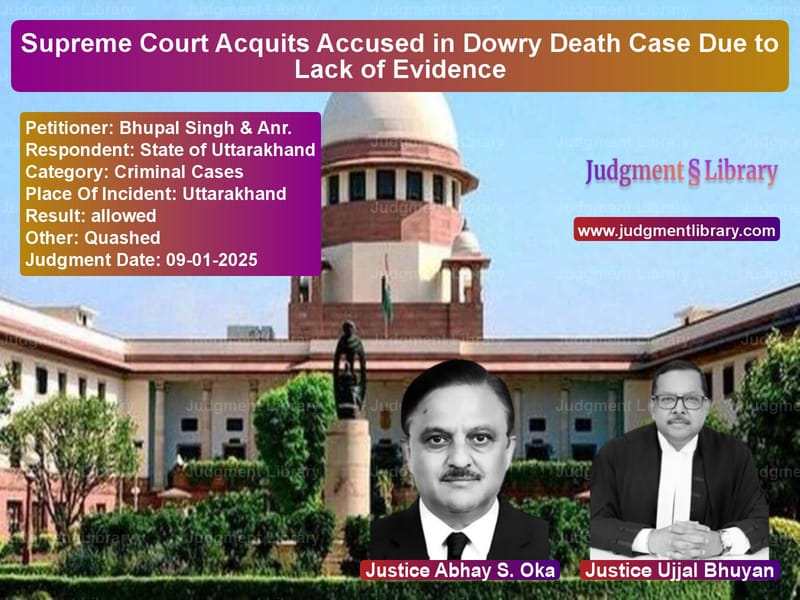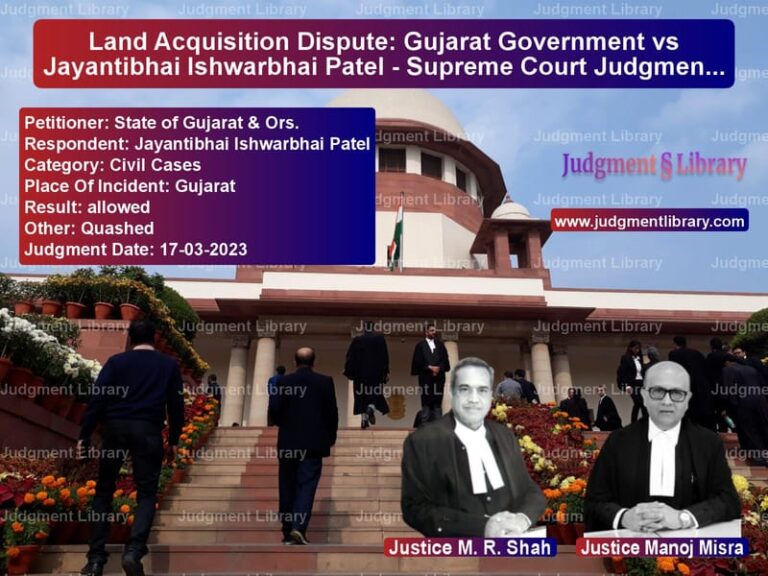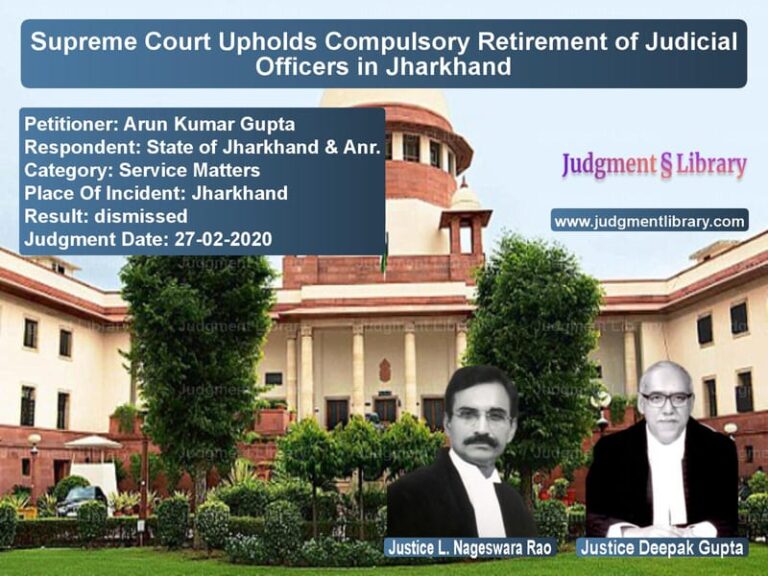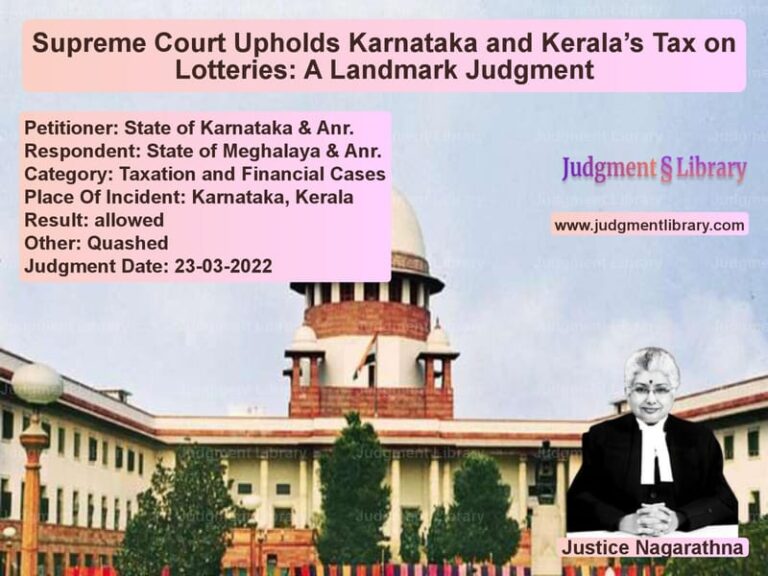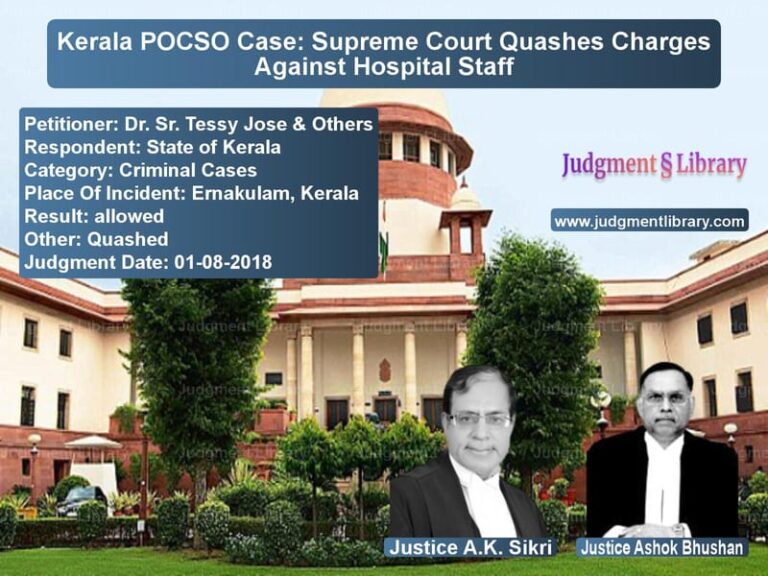Supreme Court Acquits Accused in Dowry Death Case Due to Lack of Evidence
The case of Bhupal Singh & Anr. vs. State of Uttarakhand revolved around allegations of dowry death and cruelty under Sections 304B and 498A of the Indian Penal Code (IPC). The appellants, the husband and father-in-law of the deceased Kamla Devi, were convicted and sentenced by the Sessions Court, and their conviction was upheld by the High Court. However, the Supreme Court ultimately acquitted the accused due to lack of legally admissible evidence.
Background of the Case
Kamla Devi was married to the second appellant in February 1996. On the night of 13th/14th June 1999, she was found in a burnt condition. The prosecution relied on the testimony of two key witnesses: her father, Khim Singh Nagarkoti (PW-1), and her uncle, Mohan Singh (PW-2). Their statements formed the crux of the allegations that Kamla Devi faced harassment and demands for dowry from her husband and in-laws.
Prosecution’s Arguments
The prosecution presented the following points:
- PW-1 (the father) claimed that the deceased had informed him about demands for dowry made by her in-laws, including her father-in-law, who allegedly believed the dowry given at marriage was inadequate.
- The husband, a military personnel, reportedly demanded money whenever he visited home on leave.
- PW-1 stated that he had given approximately Rs.40,000 to Rs.45,000 to Kamla Devi’s in-laws in response to these demands.
- PW-2 (the uncle) testified that Kamla Devi had confided in him about being harassed for dowry and that he had received a letter from her expressing distress.
Defense’s Counterarguments
The defense challenged the prosecution’s claims based on the following grounds:
- PW-1 failed to specify when he had last met the deceased before her death.
- The alleged payments of Rs.40,000 to Rs.45,000 were not recorded in the initial complaint or FIR.
- Letters written by PW-1 did not mention dowry demands, contradicting his oral testimony.
- PW-2 admitted uncertainty about whether the letter he received was genuinely written by Kamla Devi.
- The letter was not subjected to forensic examination, leading to an adverse inference against the prosecution.
Supreme Court’s Analysis
On Section 304B (Dowry Death)
The Supreme Court noted that to establish a case under Section 304B IPC, the prosecution must prove:
- The woman’s death was due to burns or bodily injury, or occurred under abnormal circumstances.
- The death took place within seven years of marriage.
- Just before her death, she was subjected to cruelty or harassment related to dowry demands.
While the first two conditions were met, the Court found that the prosecution failed to establish the third element. The testimonies of the prosecution’s witnesses were deemed unreliable due to contradictions and omissions.
On Section 498A (Cruelty)
The Supreme Court held that cruelty under Section 498A IPC requires:
- Willful conduct likely to drive a woman to suicide or cause grave injury.
- Harassment with the intention of coercing the woman or her relatives to meet dowry demands.
Since there was no specific evidence of physical or mental cruelty and no conclusive proof of dowry-related harassment, the Court ruled that the prosecution had failed to meet the required legal standards.
Verdict: Acquittal of the Accused
The Supreme Court quashed the judgments of both the Sessions Court and the High Court, stating:
“In the absence of legally admissible evidence, it is not possible to sustain the conviction of the appellants.”
The Court ordered that:
- The conviction and sentences under Sections 304B and 498A IPC be set aside.
- The accused be acquitted.
- The first appellant’s bail bonds be cancelled.
Conclusion
This case highlights the importance of strong and admissible evidence in dowry-related offenses. While the judiciary remains committed to protecting women from dowry harassment and violence, convictions must be based on reliable and credible proof. The Supreme Court’s ruling underscores that mere allegations, without corroborative evidence, cannot form the basis of a criminal conviction.
Petitioner Name: Bhupal Singh & Anr..Respondent Name: State of Uttarakhand.Judgment By: Justice Abhay S. Oka, Justice Ujjal Bhuyan.Place Of Incident: Uttarakhand.Judgment Date: 09-01-2025.
Don’t miss out on the full details! Download the complete judgment in PDF format below and gain valuable insights instantly!
Download Judgment: bhupal-singh-&-anr.-vs-state-of-uttarakhand-supreme-court-of-india-judgment-dated-09-01-2025.pdf
Directly Download Judgment: Directly download this Judgment
See all petitions in Suicide Cases
See all petitions in SC/ST Act Case
See all petitions in Judgment by Abhay S. Oka
See all petitions in Judgment by Ujjal Bhuyan
See all petitions in allowed
See all petitions in Quashed
See all petitions in supreme court of India judgments January 2025
See all petitions in 2025 judgments
See all posts in Criminal Cases Category
See all allowed petitions in Criminal Cases Category
See all Dismissed petitions in Criminal Cases Category
See all partially allowed petitions in Criminal Cases Category

